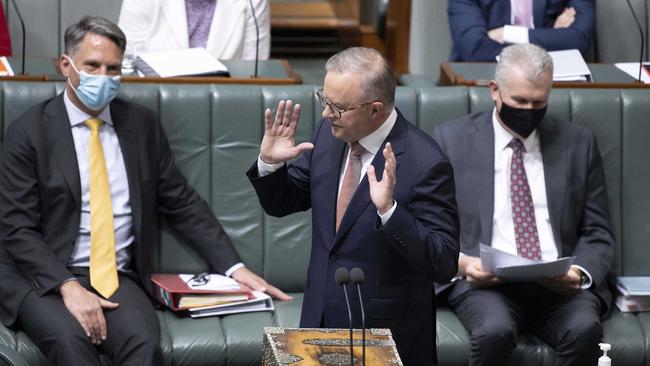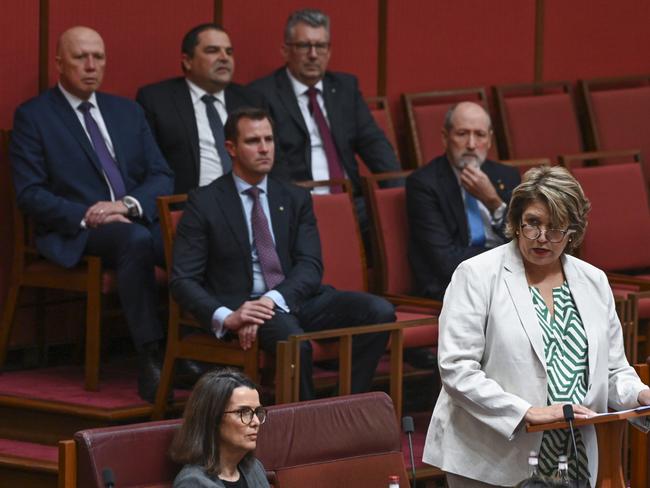Cashless debit card debate is an exercise in city politics | David Penberthy
The country’s treatment of Aboriginal Australians was always the biggest problem facing the cashless debit cards the Liberals rolled out, writes David Penberthy.
Opinion
Don't miss out on the headlines from Opinion. Followed categories will be added to My News.
The debate over the proposed abolition of the cashless debit card is a classic example of how history and ideology can get in the way of common sense when it comes to Indigenous affairs.
The history of paternalism towards Aboriginal Australians means there was already a deep well of antipathy towards the concept of cashless debit cards when they were first rolled out in several regional centres including Ceduna six years ago, but first introduced in 2014.
In the minds of critics, the system harks back to the days when the states appointed people known as “Protectors of Aborigines” to micromanage every aspect of the lives of Indigenous Australians. It’s not that long ago that First Nations people were even prevented from opening their own bank accounts, based on a racist conviction that they were incapable of managing their money.
The more recent history of John Howard’s controversial “intervention” – where the military was used to provide services in troubled Indigenous communities – has also fuelled the instinctive hostility to the idea of CDCs, coming as the policy did from a federal Liberal government.

In defence of the Albanese government, its decision to move against the cards and replace them with some yet-to-be explained opt-in system is merely the honouring of a well-documented election promise Labor made in advance of polling day.
Having said all that, there appears to be growing evidence that not enough thought had been given to Plan B, namely what happened in these communities when the CDCs are withdrawn.
And many of those qualms are coming from the exact people we should be listening to, Indigenous people, especially Indigenous women, who are worried that by ending the controlled disbursement of welfare cash, towns with a history of drug and alcohol problems will immediately find themselves beset by those problems all over again.
There is a huge difference between the ways of the past, where money was withheld from people on the basis of their colour, and a system now where greater prudence is placed on handing out cash in towns with a demonstrated history of social disorder.
It should also be stressed that, while the users of the CDCs are largely Indigenous, there are plenty of white Australians in these communities who are also on them, as the problems of drug and alcohol abuse are in no way confined to the black population in these places.

One voice who brought an important personal angle to the debate this week was the new South Australian Liberal Senator Kerrynne Liddle.
Senator Liddle is a successful businesswoman and former journalist who, aside from being a mum to children of her own, is also a foster mum to children.
One of whom was born with foetal alcohol syndrome, but who has studied hard and as a young man is now holding down full-time work.
In her maiden speech this week, the Alice Springs born Senator Liddle gave a no-holds-barred account of what drugs and alcohol have done to her communities over the years.
“Australians have contacted me lamenting the devastation and chaos they know will revisit their lives with the intended removal of the cashless debit card,” she said.
“Maybe you need to have lived in a town devastated by alcohol, drugs and violence, and seen it eroded from within.”
“So rather than unleashing the rivers of alcohol and drugs and with it more associated abuse and neglect, how about ridding our communities of the miscreants, pretenders, controllers, and rescuers; leave them nowhere to hide or thrive.”
I am sure there are those who would dismiss her contribution out of hand purely on account of her association with the Liberal Party, which implemented the CDC system and opposes their abolition.
To me, this seems typical of the blinkered and partisan approach to policy making on these topics, where people’s voices can be ignored on the basis of their political allegiance.
Ms Liddle seems to be speaking on this issue as a mother and an Arrernte woman first and a politician second.
Not that point would trouble those who seek to have her ignored.
In a tangential fashion, the story last week about the extension of the alcohol-sales restrictions in Port Augusta provided a positive example of how better management of these issues can reduce social disorder and harm.
Earlier this year, the SA Liquor Licensing Commission brought in reduced opening hours for bottle shops in Port Augusta. Stores had previously started selling grog at 8.30am, under the new system, they cannot open until 11am, and customers can only buy up to two 750ml bottles of spirits, or one 2 litre cask of wine or one 750ml bottle of fortified wine.
The ABC reported this week that the Stepping Stones Drug and Alcohol Centre in Port Augusta used to see up to 50 clients a day before the restrictions were put in place.
Chief executive Scott Wilson said the centre now saw between 20 to 40 clients a day, after bottle shops started opening two-and-a-half hours later.
“Having bottle shops open at 8.30am really wasn’t helpful to anybody, it meant that people were intoxicated by 10 o’clock in the morning,” Mr Wilson told the ABC.
“Now with the bottle shops not opening until 11am, it gives services like us much more time to try and engage with clients and talk to them about dealing with their alcohol, medical and drug issues.”
The important thing about the extension of the restrictions in Port Augusta is that they were reviewed by all the key groups including SAPOL, publicans and bottle shop owners, Stepping Stones and the Sobering Up Unit, the Port Augusta Hospital and Regional Health Service and most importantly local representatives from different Aboriginal communities. Everyone agreed to extend the system.
The approach to the future of the cashless debit card seems different.
It feels more like an exercise in city-based party politics than anything crafted around what people on the ground are calling for.





